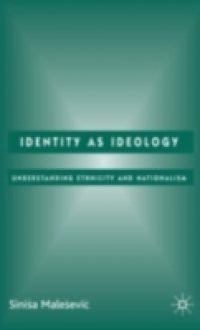The concept of national or ethnic identity has acquired such a near universal acceptance that it has become a normative straitjacket. Despite profound disagreement on whether identities are essential or existential, primordial or constructed, singular or multiple, there is little dispute over the question of whether identities exist or not. In this highly engaging and provocative study, Sinisa Malesevic interrogates the unproblematic use of concepts of identity, and in particular national or ethnic identity. Establishing a conceptual critique of identity, tracing it back to its original mathematical meaning, Malesevic argues that the historicism, geographical exclusivity and ideological potency of the term have been obscured. Increasingly during the twentieth century, and even more so today, identity served to fill the ideological vacuum created by the demise of three other ideological concepts - 'race', after the collapse of Nazism, the 'national character' and 'social consciousness', with the end of the Cold War. Focusing on the break-up of Yugoslavia and the Rwandan holocaust, Malesevic situates his analysis within a concrete empirical context, providing a thorough dissection of discourses of identity.

